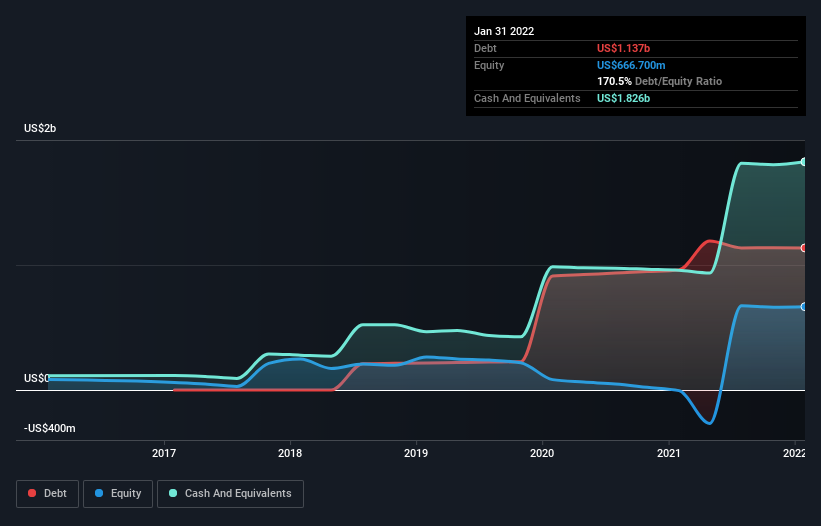- United States
- /
- IT
- /
- NasdaqGM:MDB
Is MongoDB (NASDAQ:MDB) Using Too Much Debt?
Legendary fund manager Li Lu (who Charlie Munger backed) once said, 'The biggest investment risk is not the volatility of prices, but whether you will suffer a permanent loss of capital.' It's only natural to consider a company's balance sheet when you examine how risky it is, since debt is often involved when a business collapses. We note that MongoDB, Inc. (NASDAQ:MDB) does have debt on its balance sheet. But the real question is whether this debt is making the company risky.
What Risk Does Debt Bring?
Debt assists a business until the business has trouble paying it off, either with new capital or with free cash flow. Part and parcel of capitalism is the process of 'creative destruction' where failed businesses are mercilessly liquidated by their bankers. However, a more common (but still painful) scenario is that it has to raise new equity capital at a low price, thus permanently diluting shareholders. Of course, the upside of debt is that it often represents cheap capital, especially when it replaces dilution in a company with the ability to reinvest at high rates of return. The first thing to do when considering how much debt a business uses is to look at its cash and debt together.
Check out our latest analysis for MongoDB
How Much Debt Does MongoDB Carry?
You can click the graphic below for the historical numbers, but it shows that as of January 2022 MongoDB had US$1.14b of debt, an increase on US$960.6m, over one year. However, it does have US$1.83b in cash offsetting this, leading to net cash of US$689.4m.

A Look At MongoDB's Liabilities
According to the last reported balance sheet, MongoDB had liabilities of US$526.7m due within 12 months, and liabilities of US$1.26b due beyond 12 months. Offsetting these obligations, it had cash of US$1.83b as well as receivables valued at US$195.4m due within 12 months. So it can boast US$238.4m more liquid assets than total liabilities.
Having regard to MongoDB's size, it seems that its liquid assets are well balanced with its total liabilities. So while it's hard to imagine that the US$23.2b company is struggling for cash, we still think it's worth monitoring its balance sheet. Simply put, the fact that MongoDB has more cash than debt is arguably a good indication that it can manage its debt safely. There's no doubt that we learn most about debt from the balance sheet. But it is future earnings, more than anything, that will determine MongoDB's ability to maintain a healthy balance sheet going forward. So if you want to see what the professionals think, you might find this free report on analyst profit forecasts to be interesting.
Over 12 months, MongoDB reported revenue of US$874m, which is a gain of 48%, although it did not report any earnings before interest and tax. With any luck the company will be able to grow its way to profitability.
So How Risky Is MongoDB?
By their very nature companies that are losing money are more risky than those with a long history of profitability. And we do note that MongoDB had an earnings before interest and tax (EBIT) loss, over the last year. Indeed, in that time it burnt through US$1.1m of cash and made a loss of US$307m. But the saving grace is the US$689.4m on the balance sheet. That means it could keep spending at its current rate for more than two years. MongoDB's revenue growth shone bright over the last year, so it may well be in a position to turn a profit in due course. By investing before those profits, shareholders take on more risk in the hope of bigger rewards. The balance sheet is clearly the area to focus on when you are analysing debt. However, not all investment risk resides within the balance sheet - far from it. To that end, you should be aware of the 4 warning signs we've spotted with MongoDB .
Of course, if you're the type of investor who prefers buying stocks without the burden of debt, then don't hesitate to discover our exclusive list of net cash growth stocks, today.
New: Manage All Your Stock Portfolios in One Place
We've created the ultimate portfolio companion for stock investors, and it's free.
• Connect an unlimited number of Portfolios and see your total in one currency
• Be alerted to new Warning Signs or Risks via email or mobile
• Track the Fair Value of your stocks
Have feedback on this article? Concerned about the content? Get in touch with us directly. Alternatively, email editorial-team (at) simplywallst.com.
This article by Simply Wall St is general in nature. We provide commentary based on historical data and analyst forecasts only using an unbiased methodology and our articles are not intended to be financial advice. It does not constitute a recommendation to buy or sell any stock, and does not take account of your objectives, or your financial situation. We aim to bring you long-term focused analysis driven by fundamental data. Note that our analysis may not factor in the latest price-sensitive company announcements or qualitative material. Simply Wall St has no position in any stocks mentioned.
About NasdaqGM:MDB
MongoDB
Provides general purpose database platform worldwide.
Flawless balance sheet with reasonable growth potential.
Similar Companies
Market Insights
Weekly Picks


The "Physical AI" Monopoly – A New Industrial Revolution

Czechoslovak Group - is it really so hot?


The Compound Effect: From Acquisition to Integration
Recently Updated Narratives


Rare Pure High Grade Silver with 35% Insider (Near Producer)


Swedens Constellation Software


Inotiv NAMs Test Center
Popular Narratives


Is Ubisoft the Market’s Biggest Pricing Error? Why Forensic Value Points to €33 Per Share

Undervalued Key Player in Magnets/Rare Earth


NVDA: Expanding AI Demand Will Drive Major Data Center Investments Through 2026
Trending Discussion

When was the last time that Tesla delivered on its promises? Lets go through the list! The last successful would be the Tesla Model 3 which was 2019 with first deliveries 2017. Roadster not shipped. Tesla Cybertruck global roll out failed. They might have a bunch of prototypes (that are being controlled remotely) And you think they'll be able to ship something as complicated as a robot? It's a pure speculation buy.

This article completely disregards (ignores, forgets) how far China is in this field. If Tesla continues on this path, they will be fighting for their lives trying to sell $40000 dollar robots that can do less than a $10000 dollar one from China will do. Fair value of Tesla? It has always been a hype stock with a valuation completely unbased in reality. Your guess is as good as mine, but especially after the carbon credit scheme got canned, it is downwards of $150.




